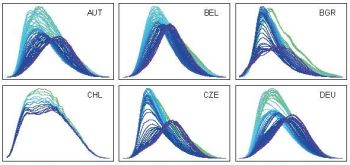Fertility Across Time and Space - Data and Research Advances
8 FEB 2018
Wittgenstein Centre Conference 2018
Vienna, 5.-7. December 2018
Today about a half of the world population lives in countries with fertility around or below two births per woman. Post-transitional fertility rates have often been unstable, undergoing unexpected downturns, upswings and reversals. To account for these developments new theories, methods, and measures have been proposed. These advances have been stimulated by an emergence of new datasets that allow in-depth comparisons of period and cohort fertility and their components between countries and subnational regions. In particular, the Human Fertility Database (HFD) and the Human Fertility Collection (HFC) have established themselves as the leading resources in aggregate-level research on fertility.
This conference aims to build on the expanding data availability and contribute to methodological and empirical advances in fertility research. We encourage submissions on fertility trends, their variation, components and driving forces, as well as on methods, data and indicators in fertility research. Research based on the Human Fertility Database and the Human Fertility Collection is especially welcome.
Programme
The Wittgenstein Centre aspires to be a world leader in the advancement of demographic methods and their application to the analysis of human capital and population dynamics. In assessing the effects of these forces on long-term human well-being, we combine scientific excellence in a multidisciplinary context with relevance to a global audience. It is a collaboration among the Austrian Academy of Sciences (ÖAW), the International Institute for Applied Systems Analysis (IIASA) and the University of Vienna.

